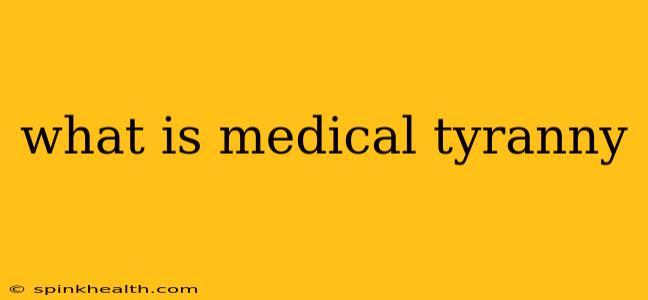The term "medical tyranny" evokes strong emotions. It conjures images of forced medical procedures, suppression of dissenting opinions within the medical community, and an overreach of governmental power into personal health decisions. But what does it truly mean, and is it a legitimate concern or merely hyperbole? Let's delve into this complex issue, examining its historical context, current manifestations, and the ethical considerations it raises.
My exploration of this topic will draw on my understanding of medical ethics, history, and political science. I aim to provide a balanced perspective, acknowledging the valid concerns while avoiding sensationalism.
What Constitutes Medical Tyranny? Is it a Real Threat?
Medical tyranny, at its core, refers to the abuse of power within the healthcare system. This abuse can manifest in various ways, including:
- Forced medical interventions: This includes mandatory vaccinations, forced sterilizations, or compulsory medical treatments without informed consent. Historically, examples exist across different cultures and time periods, highlighting the dangers of unchecked power.
- Suppression of dissent: The silencing of doctors, researchers, or healthcare professionals who challenge established medical narratives or practices. This can involve censorship, professional sanctions, or even personal attacks.
- Overreach of governmental control: Excessive governmental regulation of healthcare, leading to limitations on patient autonomy, restrictions on access to treatments, or the prioritization of political agendas over individual health needs.
- Lack of transparency and accountability: A lack of transparency in decision-making processes within healthcare systems, coupled with a lack of accountability for those wielding power, can create an environment ripe for abuse.
It's crucial to differentiate between legitimate public health measures and tyrannical practices. Public health initiatives, such as vaccination campaigns, are often necessary to protect the population from infectious diseases. However, such measures must be implemented ethically, respecting individual rights and liberties, and based on transparent and evidence-based decision-making.
What are the Historical Examples of Medical Tyranny?
History provides many troubling examples of medical practices that could be considered tyrannical. These range from the forced sterilizations carried out in several countries during the 20th century to the unethical medical experimentation conducted on vulnerable populations. Understanding these historical instances is vital to recognizing and preventing future abuses.
Is Medical Tyranny a Modern Concern?
While the blatant forms of medical tyranny seen in the past are less common today in developed nations, subtle forms of control and coercion persist. These include:
- Pressure to comply with specific medical interventions: The social and professional pressure to conform to particular medical protocols, even if individuals have concerns or reservations, can be a subtle form of coercion.
- Restrictions on access to certain treatments: Limitations on access to specific treatments based on cost, insurance coverage, or other factors can disproportionately affect vulnerable populations, limiting their choices and autonomy.
- Data privacy concerns: The collection and use of patient data raise ethical and privacy concerns, particularly when this data is used for purposes beyond the direct provision of care.
What are the Ethical Concerns of Medical Tyranny?
The core ethical concern surrounding medical tyranny is the violation of individual autonomy. Every individual has the right to make informed decisions about their own body and health. This right is essential for maintaining individual dignity and respect. When individuals are forced to undergo medical treatments against their will, or when their access to healthcare is unduly restricted, this fundamental right is violated.
How Can We Prevent Medical Tyranny?
Preventing medical tyranny requires a multifaceted approach:
- Strengthening ethical guidelines: Developing and enforcing robust ethical guidelines for medical research, practice, and public health initiatives are crucial. This includes strict adherence to informed consent principles.
- Promoting transparency and accountability: Ensuring transparency in decision-making processes within healthcare systems and establishing mechanisms for accountability are vital for preventing abuses of power.
- Protecting patient autonomy: Prioritizing patient autonomy and empowering individuals to make informed choices about their health is essential.
- Fostering open dialogue and dissent: Creating an environment where healthcare professionals and the public can openly express dissenting views without fear of retribution is crucial for ensuring a robust and ethical healthcare system.
The concept of medical tyranny is complex and multifaceted. While outright forced medical interventions are thankfully rare in modern, developed societies, the subtle forms of coercion and control, along with the ever-present threat to individual autonomy, require constant vigilance and a commitment to ethical practices. A healthy democracy and a just healthcare system require a constant, robust debate and the protection of fundamental human rights.

